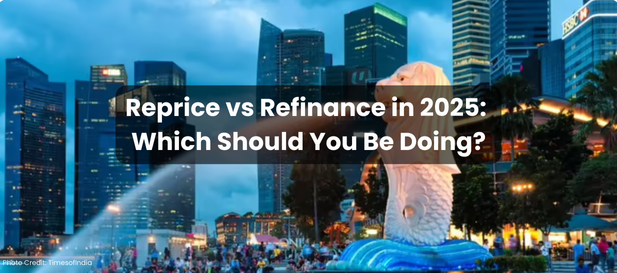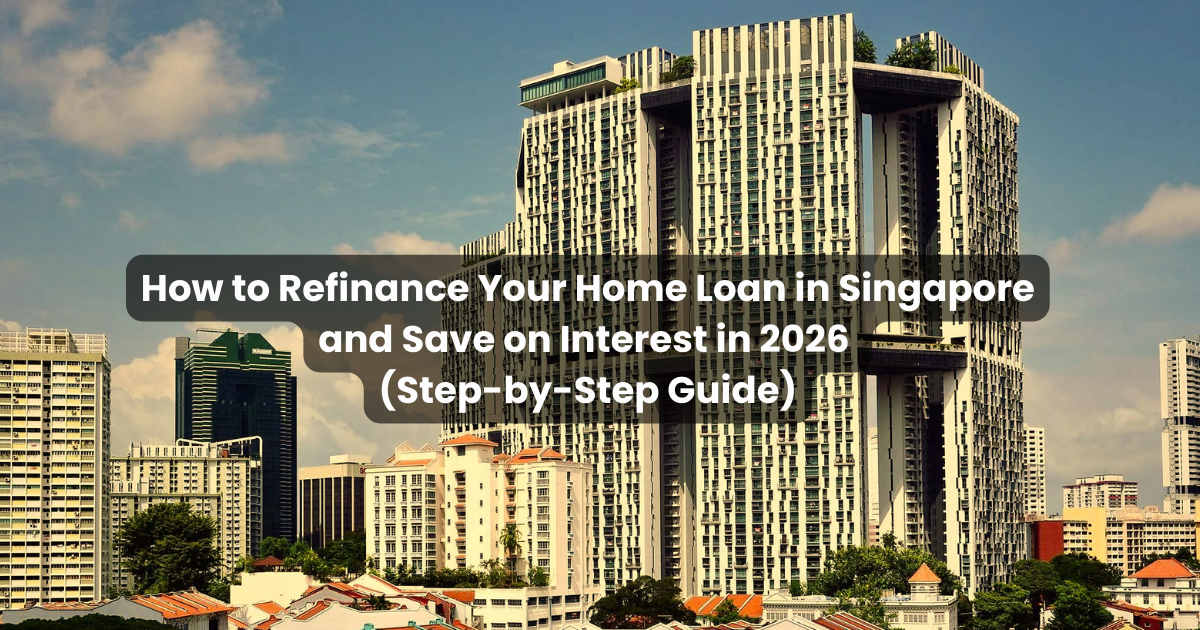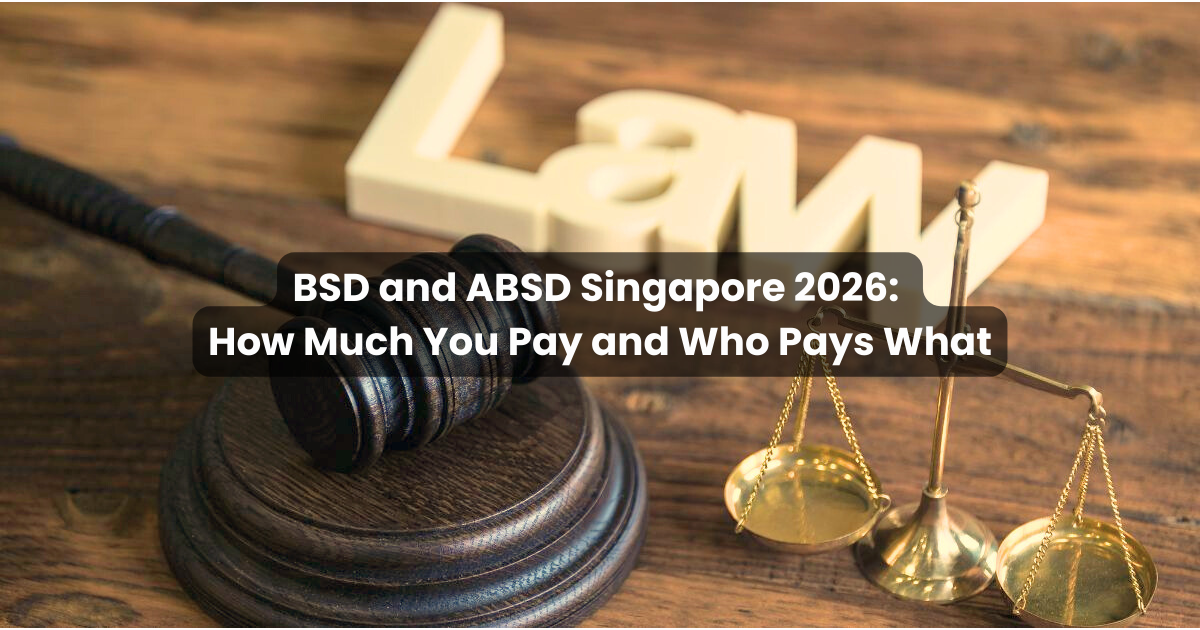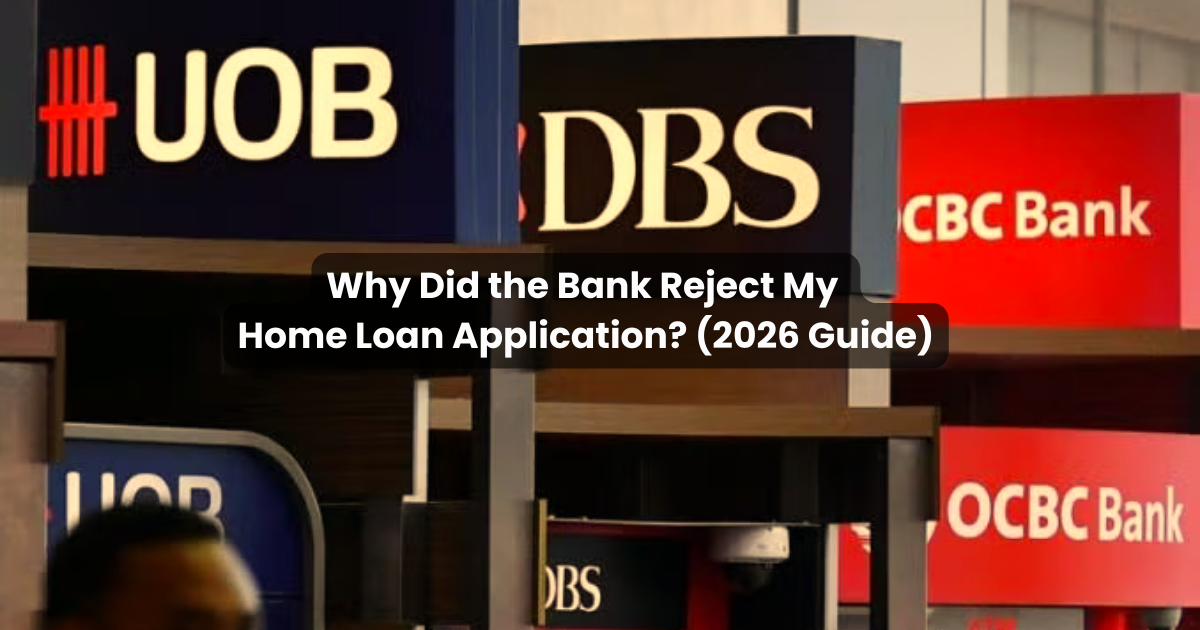- Insights & Updates
Latest News
By Chief Analyst
August 13, 2025Amid dynamic interest rate shifts in 2025, deciding between Repricing and Refinancing your home loan in Singapore is a strategic choice.
Each path differs in complexity, timing, and financial implications, especially for smaller loans or projects under construction. Understanding which option serves you best can save time, money, and hassle.
Understanding the Difference
Repricing: It involves staying with your existing bank and simply switching to a new mortgage package once your lock-in period ends. It is faster and typically takes about 1 month for the new rate to take effect. It usually involves minimal cost or even free of charge as banks want to retain clients . No legal or valuation fees are involved, and minimal document submission is required too. This route is attractive when your current lender offers competitive packages.
Refinancing: On the other hand, refinancing involves switching to a new bank. While this can unlock deeper interest savings or perks, it is slightly more complex (that is where we come in and do all the legwork for you). You need to exit your current loan (and possibly pay prepayment or cancellation fees), serve notice, complete legal and valuation processes, and wait around 2 months for full completion. Most legal and valuation fees range from S$1,500 to S$3,000.
Why Refinancing Might Not Pay Off for Smaller Loans or BUC Deals
For modest loan amounts, say below S$300,000 for HDB or S$500,000 for private properties, the math can be unfavourable. The cost savings from lower interest rates may not offset the high upfront costs. Even if refinancing offers slightly better headline rates, the net benefit can be neutral or negative once fees and clawbacks are factored in.
In the case of BUC (Building Under Construction) loans that have not reached the CSC stage, refinancing may attract cancellation fees on undisbursed loan amounts. These are substantial enough that even a slight rate advantage may become a net loss, especially when you are short of CSC or sinking large sums into valuation and legal fees.
Clawbacks and How They Erode Refinancing Gains
Banks frequently use incentives like cash rebates or fee subsidies to attract refinance customers. But these come with strings: a 3-year clawback clause. If you refinance (or even pay off) the loan within three years, you typically must return these incentives.
Thus, your savings from lower interest rates can quickly vanish if you are enticed by quick gains but exit early. For smaller loans with lower middle-term profit potential, the incentive may not justify the risks.
Scenario Walk-Through: Low Loan Amounts & BUC Loans
Imagine an HDB owner with a remaining loan of S$280,000 under a rate of 2.8%. Bank X offers refinance at 2.5% with S$1,800 subsidy.
- Refinancing Costs: S$1,800 legal & valuation – S$1,800 subsidy = break-even; no net gain after fees.
- Repricing: Admin fee of S$0 to 800 range, immediate savings on interest, its clearly a more cost-effective method.
If you are capturing a BUC package:
- S$150,000 undisbursed → at 1.5% cancellation fee → S$2,250 loss, on top of other refinancing costs.
- Once again, repricing is far more financially viable.
Add in clawback risks over three years, refinancing appears far less appealing unless the rate advantage is substantial or if you require additional features for your home loan.
Summary: When to Reprice vs When to Refinance
Reprice when:
- Your loan is small (below S$300K HDB / S$500K private).
- You are holding a BUC loan where cancellation fees apply.
- Your bank offers free or low-cost repricing, and admin fees are low.
- You value quick savings and low hassle.
- Refinancing gains are unable to cover your costs or clawbacks.
Refinance when:
- You have a large loan and savings from a better rate significantly outweigh costs.
- You are beyond the clawback or lock-in duration and stay long term.
- You need features or perks unavailable at your current bank.
- You can absorb legal, valuation, and possible cancellation penalties.
Final Thoughts
With Singapore’s mortgage rates on a gradual downward trend in 2025, refinancing now could unlock long-term financial benefits, especially if you are positioned to stay in your home beyond any subsidy clawback periods. Even if that means paying legal or cancellation fees, these can often be outweighed by greater long-term savings, particularly for larger loans.
What matters is whether you benefit after factoring in all costs such as legal, valuation, early redemption and clawback risks. Here is where we step in: we will craft a tailored cost-savings analysis for your case. You will see clearly:
- When your break-even point is
- How much net savings you can expect monthly and over the long run
- And whether refinancing genuinely outpaces or underperforms repricing.
For example, small loans under S$300K (HDB) or S$500K (private property), or BUC loans facing cancellation penalties, often do not justify refinancing, even if rates are slightly better elsewhere. But once your loan amount is large enough and lock-in is over, pursuing competitive bank packages with legal subsidies can yield substantial gains.
Let us take the guesswork out of your mortgage decision. Reach out and we will provide a no-obligation cost comparison tailored to your loan amount, tenure, timing, and goals. You will be able to decide with confidence whether refinancing, not just because it is available, but because it is financially sensible, is the right move.
Explore related content by topic
This guide outlines typical upfront Cash and CPF required. But client's profile, citizenship status, existing home loans, CPF savings, and purchase price can significantly impact your requirements.
Refinancing a home loan in Singapore can save thousands, but it’s not just about chasing lower rates. Borrowers must check TDSR and MSR eligibility, watch for lock-in penalties, subsidy clawbacks, and prepayment costs tied to rate review dates. Aligning refinancing with future plans, such as upgrading or selling, ensures savings outweigh hidden fees and risks.






